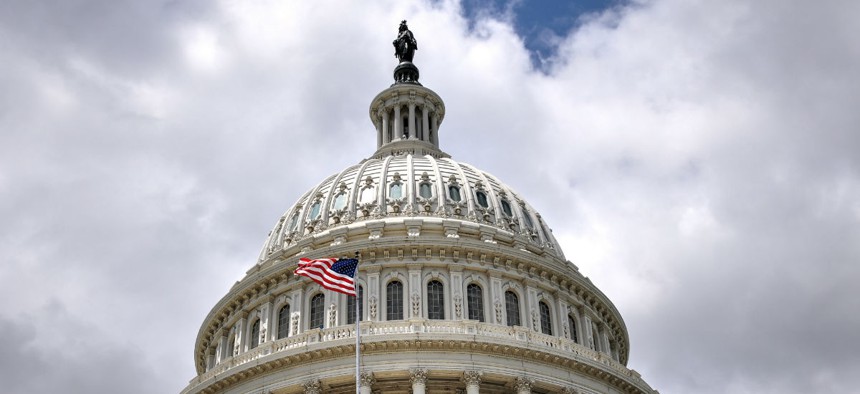
Shutterstock.com
What Democrats Winning the House Means for Federal Employees
The (likely) next oversight chairman promises more accountability for the Trump administration.
Democrats on Tuesday won dozens of House seats across the country and will control the lower chamber in the next Congress, a result that promises a big impact on the jobs and compensation for federal employees.
Republicans will sit in the House minority for the first time since 2010, which has many advocates for federal employees celebrating. In the time since Republicans took control, federal workers have endured—often through measures signed into law by President Obama—three pay freezes, higher contributions to their retirement pensions and budget cuts to many agencies across government, among other things. While a Republican still occupies the White House, advocates for federal employees’ interests on Capitol Hill expect that trend to begin reversing itself next year. Democrats themselves anticipate turning the spotlight on the Trump administration to boost oversight and push back on any efforts to upend civil service laws through executive action.
Rep. Elijah Cummings, D-Md., the top Democrat on the House Oversight and Government Reform Committee, is expected to become the committee's chairman. In an interview with Government Executive, he said he will take a two-pronged approach in his new role. He plans to look at legislation that “affects people on a day-to-day basis” such as health care, U.S. Postal Service reform and the Census, and also vowed to boost oversight of President Trump and his administration, which he equated with “fighting for the soul of our democracy.”
“One word that has not seemed to resonate with congressional Republicans is accountability,” Cummings said. “We need accountability, transparency, integrity and honesty from this administration.”
The oversight committee’s current ranking member promised to obtain documents and demand that witnesses appear at hearings to enforce his promised accountability. Cummings has repeatedly asked the Republican majority to subpoena documents and other information relating to the Interior Department’s reassignments of senior executives, Trump’s private businesses and possible misconduct by administration officials, among other issues. The likely chairman-to-be promised to shine a light specifically on the administration’s “politically motivated attacks” on career employees, as well as agency watchdogs and ethics officials. He also said he will focus on issues such as security clearance reform, Trump’s possible conflict of interests, administration officials’ ethics scandals and the “zero-tolerance” policy that led to family separations at the U.S.-Mexico border.
“We are required to be a check and balance over the executive branch,” Cummings said. “Republicans in the House have been acting as President Trump’s defense counsel, and that does not bode well for a sound democracy. There has to be accountability or we are in big trouble.”
Matt Biggs, secretary-treasurer at the International Federation of Professional and Technical Engineers, said he expects two benefits for federal workers. A Democratic House, he said, will provide a “much needed check and balance” on the Trump administration. He criticized Republicans because they “abdicated their responsibility on federal labor law,” referring to Trump’s executive orders aimed at reforming the disciplinary process for federal workers and curbing the powers of their unions. He also predicted that attempts to slash federal employee compensation “will come to a halt” with Democrats controlling one chamber.
Democrats held a meeting with major federal employee unions last month, and, according to those present, promised to be “laser-focused” on hits the federal workforce has taken over the last decade to make the public more aware of those changes. Democratic leaders listened to employee advocates as they spelled out their priorities, ranging from unwinding pension contribution hikes to lowering premiums for long-term health care insurance. Lawmakers appeared open to using legislation to try to roll back Trump’s workforce orders, which a federal judge largely struck down but are still being deliberated in appeals court.
Jessie Klement, the National Active and Retired Federal Employees Association staff vice president for advocacy, said Congress may offer federal employees a more generous pay raise in 2020 as a result of House control flipping. Democrats have floated a raise closer to the employment cost index—2.8 percent over the last 12 months, according to the Bureau of Labor Statistics—or to reinstate parity with the military. Members of the armed services are set to receive a 2.6 percent pay raise in 2019. Trump proposed a freeze on civilian pay next year, but lawmakers appeared poised to provide a 1.9 percent increase.
While the pressure may lighten to some degree, Klement cautioned, legislation targeting federal workers is not likely to disappear.
“We play a little less defense,” she said of a Democratic House, “but the cuts that have been proposed for federal pay and benefits have come regardless of who is in the White House and some have come regardless of who is in control of Congress.”
Tony Reardon, president of the National Treasury Employees Union, similarly said he expects less adversarial action for his members next year, but warned that feds are not out of the woods entirely.
“It is certainly my hope that a new Congress will be thoughtful about these issues and do what I think is in the best interest of American taxpayers and federal employees,” Reardon said.
He added, however, that the president can still take unilateral action.
“A new Congress is not going to solve or stop necessarily these or any additional executive orders like were put forward by the administration,” Reardon said. “It’s absolutely not going to be a cure all.”
Biggs said his team is still prepared to tackle the issues of the day as they arise.
“It won’t be easy,” he said. “It will still be a fight.”







